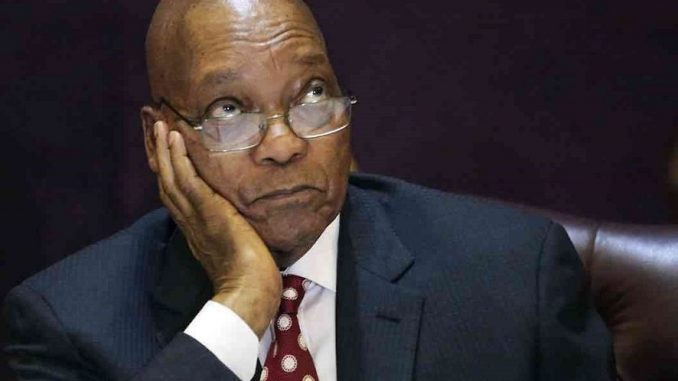
South African president Jacob Zuma has resigned on Wednesday evening after pressure from his party the African National Congress (ANC).
Zuma announced his resignation after a long speech broadcast on national television following an earlier speech Wednesday morning accusing his party of treating him unfairly.
75-year-old Zuma has served as president since 2009 and has faced numerous allegations of corruption which he denies. He has also survived several motions of no confidence.
The leader of the ANC party and Deputy President Cyril Ramaphosa will take over the leadership of the party until the next general election in 2019.
South Africa has a new president – Cyril Ramaphosa, following the resignation of Jacob Zuma on Wednesday amidst corruption charges. Ramaphosa, who is the president of the African National Congress (ANC), took over as the President of South Africa following a parliamentary approval.
His new role is already being disputed by opposition figures and civil society organisations who believe he will continue the dark path of Zuma. The leader of the opposition Economic Freedom Fighters (EFF), Julius Malema has called for an early election saying: “If Ramaphosa becomes President, he is simply going to replace Zuma’s corruption stooges with his own corruption stooges.”
South African political party Congress of the People (COPE) also rejected the automatic selection of Ramaphosa as president. Its president Mosiuoa Lekota said at a press conference on Thursday that “there are 56 million South Africans, 1000’s of them would be better in government than ‘our Cyril.’”
But who is Ramaphosa? Here’s all you need to know about him.
Early days
Ramaphosa was born on November 17, 1952, in Johannesburg. He is the second of three children and his father was a policeman. He attended primary and high school in Soweto where he grew up. He subsequently went to Mphaphuli High School in Sibasa, Limpopo, where he was elected head of the Student Christian Movement following his staunch Christian beliefs.
Ramaphosa studied law at the then University of the North (Turfloop). He was active in the South African Students Organisation, a body which was focused on black consciousness ideology. Ramaphosa still went ahead with his political activism through the Black People’s Convention after graduating with a degree in law. He was even jailed for six months due to his activism.
He later joined the Council of Trade Unions of South Africa which was to form the National Union of Mineworkers (NUM) and became its first secretary-general. Through that, he was able to turn the NUM into the largest trade union in the country.
Political life
In 1991, Ramaphosa was elected secretary-general of the ANC and became one of the key members who helped build the country’s constitutional democracy.
He was basically the lead negotiator of the ANC during negotiations on a post-apartheid arrangement and helped in bringing up a new constitution for the country.
Ramaphosa, however, lost the contest to become President Nelson Mandela’s deputy to Thabo Mbeki in 1994. He then decided to enter into business, where he built a large investment holding company called Shanduka. The company was focused on mining and fast foods. Through his 20-year-period in entrepreneurship, Ramaphosa was able to build strong a relationship and links with the private sector.
He was criticised by some members of the ANC for the conduct of his business interests, even though he has never been indicted for illegal activity in any of these controversies.
He, nevertheless, was still close to the ANC, as he served as a member of the national disciplinary committee.
Ramaphosa returned to the political scene at the ANC’s 2012 elective conference in Mangaung, Bloemfontein where he was elected deputy president of the ANC, and later of the country.
Two years before his election, he was the deputy chairman of the state-run National Planning Commission which brought out a National Development Plan. The plan was tabled as a blueprint to determine the type of society suitable for South Africa.
Deputy President of South Africa
Ramaphosa was appointed Deputy President by Jacob Zuma on May 25, 2014, and subsequently made the leader of Government Business in the National Assembly in terms of section 91(4) of the Constitution. He was in charge of the affairs of the national executive in Parliament; the programming of parliamentary business initiated by the national executive, within the time allocated for that purpose and ensured that Cabinet members attend to their parliamentary responsibilities.
On June 3, 2014, President Jacob Zuma announced that Ramaphosa would be appointed as Chairman of the National Planning Commission, with Minister in the Presidency for Planning, Jeff Radebe serving as the Commission’s Deputy Chairman.
Ramaphosa in July that same year urged for unity in the country, after calls by now leader of the opposition EFF Julius Malema to scrap the singing of the Afrikaans portion of the national anthem.
ANC President
After he announced that he would seek the ANC Presidency in 2017, with his second run for President, he was endorsed by so many bodies including the trade union COSATU, the National Union of Mineworkers as well as the Northern Cape, Eastern Cape and Gauteng provincial ANC leadership.
Other individuals like the education minister Angie Motshekga, Cosatu’s president Sdumo Dlamini, former finance minister Pravin Gordhan and former KwaZulu-Natal Premier Senzo Mchunu also came out strongly to support him.
Ramaphosa was elected the president of the ANC on December 18, 2017, at the party’s 54th Elective Conference, defeating his rival Nkosazana Dlamini-Zuma, ex-wife of President Zuma, by 2440 votes to 2261.
He is now going to be the president of the country following the resignation of Jacob Zuma. But the question people are asking now is how effective will he be.
Even though he has been the deputy president of the country and the ANC for five years, many still feel he has not been so influential and hence the doubts about his leadership skills.
BY ISMAIL AKWEI
Source
